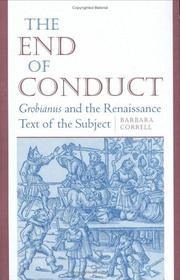| Listing 1 - 3 of 3 |
Sort by
|
Book
ISBN: 3500256503 Year: 1972 Publisher: Walluf
Abstract | Keywords | Export | Availability | Bookmark
 Loading...
Loading...Choose an application
- Reference Manager
- EndNote
- RefWorks (Direct export to RefWorks)
German literature --- German language --- Dialectology --- Scheidt, Caspar --- Scheit, Caspar, --- Rhyme.
Book
ISBN: 1501733850 Year: 2019 Publisher: Ithaca, NY : Cornell University Press,
Abstract | Keywords | Export | Availability | Bookmark
 Loading...
Loading...Choose an application
- Reference Manager
- EndNote
- RefWorks (Direct export to RefWorks)
Grobianus et Grobiana, a little-known but key Renaissance text, is the starting point for this examination of indecency, conduct, and subject formation in the early modern period. First published in 1549, Friedrich Dedekind's ironic poem recommends the most disgusting behavior-indecency-as a means of instilling decency. The poem, Barbara Correll maintains, not only supplements prior conduct literature but offers a reading of it as well; her analysis of the Grobianus texts (the neo-Latin original, the German vernacular adaptation, the 1605 English translation, and Thomas Dekker's Guls Horne-booke) also provides a historical account of conduct during the shift from a medieval to a Renaissance sensibility. According to Correll, the effect of Dedekind's text is to establish normative masculine identity through the labor of aversion. The gross, material body must be subjugated and reconstituted in order to attain its status as the bearer of civil manhood. Correll shows how the virtual subject of civil conduct emerges in dominant yet necessarily beleaguered relation to colonized Others, whether in feminine, animal, or peasant guise. Referring to Renaissance courtesy literature from Castiglione to Erasmus, she identifies this double drama of early modern subject formation as central to conduct books as well as to their grobian extensions. Her work places Grobianus in the civilizing process that marked emerging bourgeois society in early modern Europe.
Literary Studies. --- Dedekind, Friedrich, --- Erasmus, Desiderius, --- Dekker, Thomas, --- Scheidt, Caspar, --- Knowledge --- Education. --- Influence.

ISBN: 0801431018 Year: 1996 Publisher: Ithaca (N.Y.): Cornell university press
Abstract | Keywords | Export | Availability | Bookmark
 Loading...
Loading...Choose an application
- Reference Manager
- EndNote
- RefWorks (Direct export to RefWorks)
Conduct of life in literature. --- Courtesy in literature. --- Didactic poetry, Latin (Medieval and modern) --- Human body in literature. --- Humanists --- Renaissance. --- History and criticism. --- Conduct of life in literature --- Courtesy in literature --- Human body in literature --- Renaissance --- Revival of letters --- Civilization --- History, Modern --- Civilization, Medieval --- Civilization, Modern --- Humanism --- Middle Ages --- Scholars --- Body, Human, in literature --- Human figure in literature --- Latin didactic poetry, Medieval and modern --- Latin poetry, Medieval and modern --- History and criticism --- History --- Dedekind, Friedrich, --- Dekker, Thomas, --- Erasmus, Desiderius, --- Scheidt, Caspar, --- Scheid, Kaspar, --- Scheidt, Casparus, --- Scheidt, Kaspar, --- Scheit, Kaspar, --- Scheyt, Kaspar, --- Schiet, Caspar, --- Erasmus, Desiderius --- Érasme --- Desiderius Erasmus --- Erasm, Dezideriĭ --- Erasme, Désiré --- Erasmo, --- Erasmo, Desidério --- Erasmus, --- Ėrazm, --- Erazm, --- Roterodamus, Erasmus --- Rotterdamskiĭ, Ėrazm --- Rotterdamský, Erasmus Desiderius --- Роттердамский, Эразм --- Эразм, --- Ерасм, Дезидерий --- Dedekindus, Fredericus, --- Dedekindus, Fridericus, --- Influence. --- Knowledge --- Education. --- Erasmus Roterodamus, Desiderius --- Erasmus --- エラスムス, デシデリウス --- Desiderius Erasmus, --- Erasm, Dezideriĭ, --- Erasme, Désiré, --- Erasmo, Desidério, --- Roterodamus, Erasmus, --- Rotterdamskiĭ, Ėrazm, --- Rotterdamský, Erasmus Desiderius, --- Роттердамский, Эразм, --- Ерасм, Дезидерий, --- אראסמוס, דסידריוס,
| Listing 1 - 3 of 3 |
Sort by
|

 Search
Search Feedback
Feedback About UniCat
About UniCat  Help
Help News
News